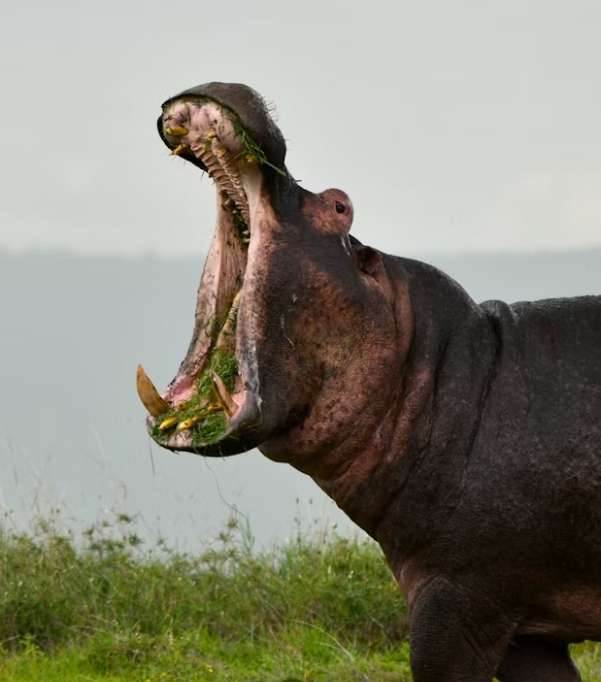Wrongful Death Lawsuit Filed Against Safari Company Following Fatal Hippopotamus Attack
This tragic incident underscores the inherent dangers of wildlife tourism and raises critical questions about responsibility and accountability when venturing into the wild. Lisa Manders, a 70-year-old woman from New Jersey, lost her life during what should have been a celebratory anniversary trip to Zambia with her husband, Craig. While on a guided walking safari, she was fatally attacked by a hippopotamus, a creature known for its unpredictable aggression and formidable strength. This devastating event has sparked a lawsuit against the US-based safari company, African Portfolio, who arranged the Manders’ trip, alleging negligence and a failure to ensure the couple’s safety. The lawsuit paints a picture of preventable tragedy, claiming the tour guides, purportedly provided by the Zambian lodge Chiawa Safaris, were ill-equipped to handle the situation and failed to intervene effectively, even though one possessed a rifle.
The legal battle centers on the complex web of responsibility within the tourism industry. African Portfolio maintains they acted solely as booking agents for the Manders’ accommodation and were not responsible for the safari operation itself, placing the onus on Chiawa Safaris, the lodge owners who allegedly provided the guides. Chiawa Safaris, in turn, asserts that safety protocols were in place and guests were warned to return to their vehicle during the hippopotamus attack, although whether Lisa Manders received this warning before the fatal encounter remains unclear. This conflicting narrative highlights the challenges in determining liability when multiple parties are involved in a tragic incident abroad. The legal proceedings will likely delve into the contractual agreements between African Portfolio, Chiawa Safaris, and the Manders to ascertain the scope of each party’s responsibility for the safety of the guests. The outcome of this case could significantly impact how safari companies operate and the level of accountability they bear in ensuring their clients’ safety in inherently dangerous environments.
Beyond the specifics of this case, the incident illuminates the broader issue of wildlife tourism and the delicate balance between experiencing the natural world and mitigating the inherent risks. While safaris offer an unparalleled opportunity to observe animals in their natural habitat, they are inherently unpredictable and potentially dangerous. Hippopotamuses, despite their herbivorous diet, are notoriously territorial and aggressive, responsible for more human fatalities in Africa than lions, crocodiles, or elephants combined. Their immense size and power make them formidable adversaries, and encounters can quickly turn deadly, as tragically illustrated by Lisa Manders’ death and other documented incidents. The inherent danger inherent in such close encounters with wildlife warrants careful consideration and thorough risk assessment by both tour operators and tourists alike.
This tragedy spotlights the need for stringent safety protocols and comprehensive training for guides operating in these environments. The lawsuit alleges that African Portfolio failed to verify the competence and training of the guides provided by Chiawa Safaris, a critical lapse that potentially contributed to the fatal outcome. Effective training should equip guides with the knowledge and skills to assess and manage risks, respond appropriately to wildlife encounters, and employ appropriate safety measures to protect their clients. Furthermore, tour operators must ensure clear communication of safety procedures to clients, emphasizing the potential dangers and the importance of adhering to guidelines. A thorough briefing on appropriate behavior and emergency procedures is essential before embarking on any wildlife activity, ensuring that tourists are aware of the potential risks and understand their role in mitigating them.
The Manders’ lawsuit seeks unspecified financial damages, but the legal action transcends monetary compensation. It aims to hold the safari company accountable for alleged negligence and seeks to prevent future tragedies by raising awareness about the importance of safety in wildlife tourism. The case could set a precedent for the level of responsibility expected from tour operators and potentially influence industry practices. Beyond the courtroom, the incident serves as a stark reminder of the inherent risks associated with venturing into the wild and the importance of respecting the power and unpredictability of nature. The tragic loss of Lisa Manders underscores the need for a renewed focus on safety protocols, guide training, and informed decision-making by both tour operators and tourists alike.
In a broader context, this incident raises important questions about sustainable tourism and the delicate balance between experiencing the natural world and preserving it. As wildlife tourism continues to grow, it is imperative that operators prioritize safety and sustainability, ensuring that these ventures do not come at the cost of human life or the well-being of the animals and their ecosystems. This requires a collaborative approach involving tour operators, local communities, conservationists, and tourists themselves. Open dialogue, information sharing, and the continuous improvement of safety standards are crucial to creating a responsible and sustainable tourism industry that minimizes risks and maximizes the benefits for all stakeholders.
Share this content:












Post Comment